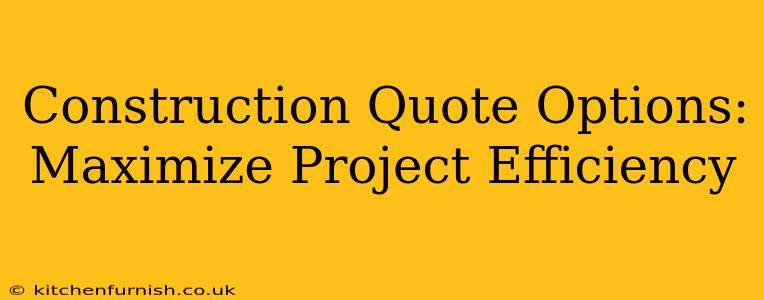Winning construction projects hinges on more than just competitive pricing; it's about presenting compelling quote options that demonstrate your understanding of the client's needs and your project management prowess. This means crafting quotes that not only showcase your competitive pricing but also highlight your efficiency and value proposition. This article explores various construction quote options and strategies to optimize your project efficiency, increasing your chances of securing the job and maximizing profitability.
What are the Different Types of Construction Quotes?
Several quote types cater to different project scopes and client preferences. Understanding each type is crucial for selecting the most appropriate option for each bid:
-
Fixed-Price Quotes (Lump Sum): This traditional method offers a predetermined, all-inclusive price for the entire project. It's ideal for projects with clearly defined scopes of work and minimal anticipated changes. However, unforeseen circumstances can impact profitability if not properly accounted for in the initial estimate.
-
Unit Price Quotes: This approach prices individual work items (e.g., cubic yards of concrete, hours of labor). It's beneficial for projects with variable scopes or those where quantities might change during execution. The final price is calculated based on the actual quantities used.
-
Time and Materials (T&M) Quotes: This option charges for labor and materials used, typically with a markup. It's best suited for projects with undefined scopes or those requiring ongoing adjustments. Transparency is key, as clients need clear visibility into costs throughout the project.
-
Cost-Plus Quotes: This method involves reimbursing the contractor for actual costs incurred, plus a predetermined percentage (or fee) for profit and overhead. It's suitable for complex projects with significant uncertainties, offering flexibility but requiring meticulous record-keeping.
How to Choose the Best Quote Option for Your Project?
The optimal quote type depends on several factors:
-
Project Complexity: Simple projects with well-defined scopes are better suited for fixed-price quotes. Complex projects with uncertainties often require T&M or Cost-Plus.
-
Client Preferences: Some clients prefer the predictability of fixed-price quotes, while others might need the flexibility of T&M or Cost-Plus. Understanding client expectations is crucial.
-
Risk Assessment: Accurately assess potential risks and uncertainties. If risks are high, a T&M or Cost-Plus approach might be more appropriate to protect your business.
-
Your Expertise: Confidence in your estimating skills is key to successful fixed-price bids. If uncertainties exist, a more flexible quote type might be safer.
What are the Key Components of a Competitive Construction Quote?
Beyond the pricing model, a comprehensive quote should include:
-
Detailed Scope of Work: Clearly outline all tasks, deliverables, and specifications to avoid misunderstandings.
-
Detailed Material Specifications: List all materials, quantities, and their sources to ensure transparency and avoid disputes.
-
Payment Schedule: Define a clear payment schedule outlining milestones and payment amounts.
-
Project Timeline: Provide a realistic project timeline with key milestones and completion dates.
-
Terms and Conditions: Include terms related to payment, liability, change orders, and dispute resolution.
-
Insurance and Licensing: Clearly state your insurance coverage and relevant licenses.
-
Warranty Information: Outline any warranties provided on materials or workmanship.
How Can I Improve the Efficiency of My Construction Quoting Process?
Streamlining your quoting process is crucial for maximizing efficiency and competitiveness:
-
Utilize Construction Estimating Software: Software can automate many aspects of the process, reducing errors and saving time.
-
Develop Standardized Templates: Create standardized templates for your quotes to ensure consistency and reduce manual input.
-
Maintain an Up-to-Date Material Database: Keep your database of material costs and supplier information updated regularly.
-
Invest in Training for Your Team: Training your team on efficient quoting practices can improve accuracy and speed.
-
Establish a Clear Quoting Process: Define a clear step-by-step process for generating quotes to maintain consistency and organization.
How Can I Reduce Errors in My Construction Quotes?
Accuracy is paramount. Here's how to minimize errors:
-
Double-Check Calculations: Carefully review all calculations and measurements to prevent errors.
-
Utilize Multiple Estimators: Having multiple team members review quotes can catch potential mistakes.
-
Regularly Update Your Cost Database: Keep your material and labor cost database current to ensure accuracy.
-
Factor in Contingency: Include a contingency buffer to account for unforeseen circumstances.
By strategically selecting the appropriate construction quote option and implementing efficient quoting processes, you can significantly increase your chances of securing projects, enhancing profitability, and establishing a reputation for reliability and efficiency within the construction industry.

